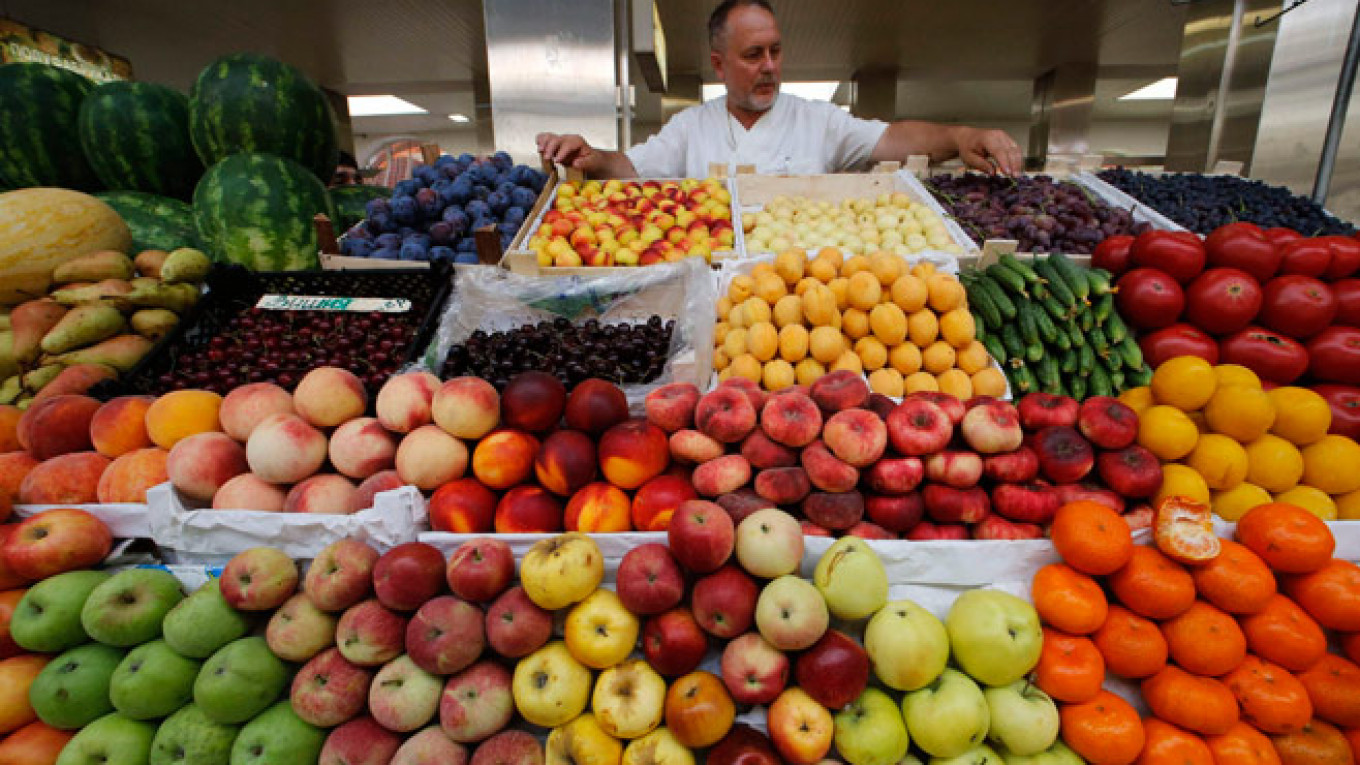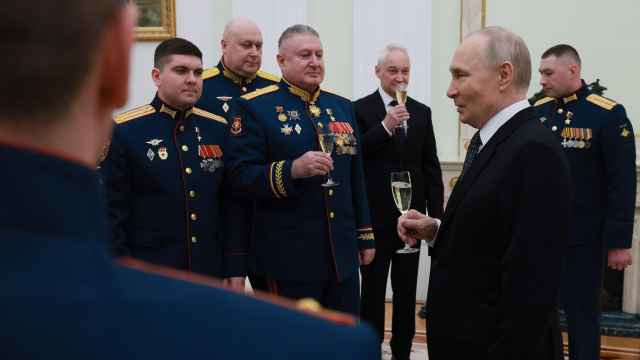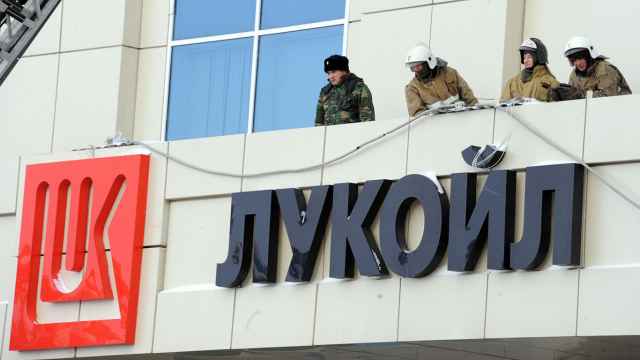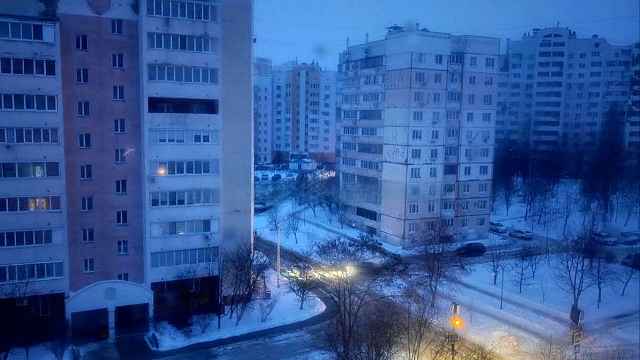While the ban on many food imports imposed by President Vladimir Putin on Wednesday has sparked fears of Soviet-era shortages among some sections of Russian society, political analysts told The Moscow Times that it will have little effect on the level of support for the government among the public.
Expats and Russians Alike Say Goodbye to Favorite Imported Foods
The Moscow Times
The Russian blogosphere on Thursday erupted in jokes and do-it-yourself recipes as Russians and expats came together to mourn the Western foods they'd be forced to say goodbye to under an import ban announced by Prime Minister Dmitry Medvedev.
The BBC's Moscow correspondent, Daniel Sanford, quipped on Twitter that “EU-sanctioned Russian officials will no longer be able to eat Italian salami, French cheese, British salmon, German sausage.”
Yulia Bragina of SkyNews asked: “Will the Russian elite keep supporting Putin when there is only one type of horrible cheese and Crimean wine left to celebrate that oil bonus?”
Throughout Thursday, Russian Twitter users began posting photos of bare shelves in their local grocery stores as imported goods were cleared out amid a rush to buy them before it was too late.
Others reacted favorably to the ban, saying it would help keep Russians in shape by eliminating unhealthy foods like McDonald's cheeseburgers from their diets.
Some weren't so quick to surrender, however, offering tips on how to improvise and make Coca-Cola from potatoes, Bailey's Irish Cream liqueur from vodka and a Russian form of caramel.
The phrase, “Let the hunger games begin!” — a reference to a series of books and movies about a dystopian world — was a common sight, posted next to a photo of a grinning Putin.
Many Instagram users joked that photos by Russian foodies would now be limited to a traditional Russian combination of buckwheat porridge and meat.
Opposition leader Alexei Navalny and New Republic journalist Julia Ioffe criticized the imports ban for punishing ordinary Russians.
“Europe's sanctions are against oligarchs and the nomenclature. Russia's sanctions are against citizens of Russia,” read Navalny's Twitter account, currently operated by his wife and supporters while he is under house arrest.
Ioffe wrote that “Moscow as I knew it is pretty much over” on Twitter on Thursday, voicing a sentiment echoed by many in the city's expat community.
In a separate article, Ioffe criticized the ban for punishing Russia's urban middle class, those who took to the streets in 2011-2012 to protest against President Vladimir Putin's rule.
Following the publication Thursday of the list of banned products, pictures of empty shelves from Soviet times flooded Russian social networks and blogs, along with sardonic jokes about how in introducing the ban, Russia had demonstrated its care for its citizens' spiritual well-being by letting them choose from only two kinds of cheese, fish, meat and other products.
Despite widespread anger at the move to limit the availability of foreign food, this negative reaction is still limited to an exclusive and politically conscious audience that is already largely critical of the government anyway, according to Lev Gudkov, director of the independent Levada Center pollster.
"According to our research, public opinion in Russia is conservative and only begins to seriously react to events two or three weeks after they happen. The consequences of these decisions, as well as of sanctions overall, will only become visible in November," as people are more politically apathetic during the summer, Gudkov told The Moscow Times in a phone interview.
Gudkov said he did not expect immediate drastic changes in public opinion as a result of the new measures imposed by the Kremlin.
The partial foreign food ban has brought to the fore painful memories of the late Soviet Union, when people stood in line for basic commodities such as bread, butter and oatmeal. A video of a "food funeral," an art performance in central Moscow in 1990 in which a mock funeral procession marched along the capital's main street to bemoan the lack of food in stores, went viral Thursday.
The potential disappearance of even a limited number of foreign-produced products from shelves has demonstrated to what extent memories or even phantom pains from the Soviet Union are alive in society, according to Nikolai Petrov, an analyst of Russian internal politics with the Higher School of Economics.
At the same time, according to Petrov, the Kremlin has carefully calculated this move, with Putin's ratings now soaring at 87 percent.
"Even if people are seriously inconvenienced by the food ban, they will still understand that this is the necessary price for the victory in Crimea," Petrov said.
Russian society currently finds itself in an unusual situation in which all the divisions between various groups have been leveled down by patriotic zeal over the ongoing Ukraine crisis. This level of patriotism has been spurred by propaganda in the government-controlled media, according to Gudkov.
"Propaganda has made society more uniform, meaning that what people think in rural and less developed areas does not differ as much from what people think in big cities," he said.
Therefore, even though the ban on some foreign foods will be mostly felt among middle-class people in urban areas, it is unlikely that it will have any effect on their political ideas, according to Gudkov.
"We will feel all the negative effects of this policy, as well as other Ukraine-related policies, but only in the long term. Right now people are deprived of the chance to seriously reflect on what is going on," he said.
See also:
Russia Bans Food Imports From U.S., EU, Australia, Canada, Norway
Contact the author at [email protected]
A Message from The Moscow Times:
Dear readers,
We are facing unprecedented challenges. Russia's Prosecutor General's Office has designated The Moscow Times as an "undesirable" organization, criminalizing our work and putting our staff at risk of prosecution. This follows our earlier unjust labeling as a "foreign agent."
These actions are direct attempts to silence independent journalism in Russia. The authorities claim our work "discredits the decisions of the Russian leadership." We see things differently: we strive to provide accurate, unbiased reporting on Russia.
We, the journalists of The Moscow Times, refuse to be silenced. But to continue our work, we need your help.
Your support, no matter how small, makes a world of difference. If you can, please support us monthly starting from just $2. It's quick to set up, and every contribution makes a significant impact.
By supporting The Moscow Times, you're defending open, independent journalism in the face of repression. Thank you for standing with us.
Remind me later.






